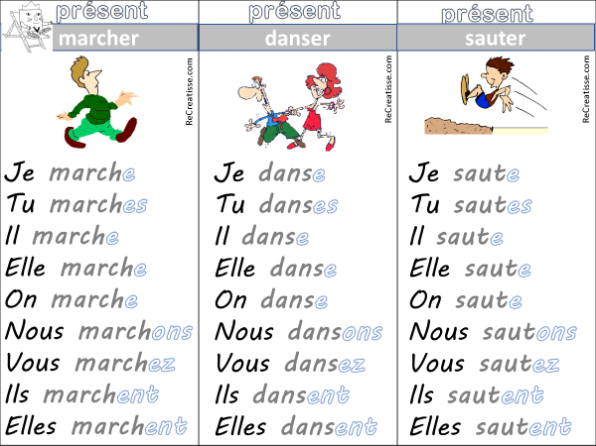
French Present tense
When learning French, one of the most fundamental and important aspects of grammar is to conjugate French tense and especially Present tense.
In this comprehensive guide, we’ll explore the present tense in French, from its formation to its various uses, and provide tips and examples to help you master this essential aspect of the language.
The present tense in French, also known as « le présent, » is used to describe actions, events, or situations that are happening right now or those that occur regularly. In English, it’s the equivalent of saying « I eat, » « you talk, » or « he walks. » To understand the French present tense, you need to grasp its conjugation rules and its various uses.
Conjugating Regular Verbs in the Present Tense
In French, there are three main groups of regular verbs, categorized based on their infinitive endings: -er, -ir, and -re. Most French verbs are in the 1st group, so you can see how important it is to master the present tense. Let’s take a closer look at how to conjugate these verbs in the present tense:
1st group verbs: ER ending

French verbe first group (image from recreatisse.com)
All the verbs in the 1st group have the same endings in the present tense. To conjugate them, drop the -er ending and add : E, -ES, -E, -ONS, -EZ, -ENT
An exemple here : discuter (to talk)
- Je discute (I talk)
- Tu discutes (You talk)
- Il/elle/on discute (He/she/one talks)
- Nous discutons (We talk)
- Vous discutez (You talk)
- Ils/elles discutent (They talk)
The pronunciation for the 1st, 2nd, 3rd person singular, and 3rd person plural are identical.
For irregular verbs ending in – CER:
A cedilla must be added to verbs ending in -CER in the 2nd person plural, such as se déplacer, commencer, annoncer, etc.
The rule for other tenses is that the cedilla is placed in front of the vowels a, o and u, and indicates whether the letter c is pronounced [s].
Examples:
- Nous nous déplaçons
- Nous annonçons
- Nous commençons
For irregular verbs ending in -GER :
An E must be added after the G for verbs such as nager, manger, partager, and in the 2nd person plural such as déplacer, annoncer, commencer.
- Nous nageons
- Nous mangeons
- Nous partageons
These 2 rules apply for phonetic reasons. Because without the cedilla the c is pronounced K
And without the e after the g, the g is pronounced Gue as in sing
Double the L and T for the verbs appeler (to call) and jeter (to throw away), in all persons except for we and you.
- J’appelle / Je jette
- Tu appelles / Tu jettes
- Il/elle/on appelle / il jette
- Nous appelons / nous jetons
- Vous appelez / vous jetez
- Ils/ elles appellent / ils jettent
For verbs such as: se lever, acheter, emmener…
You need to add a grave accent to the E for all people except nous and vous:
- J’emmène
- Tu emmènes
- Il /elle/on emmène
- Nous emmenons
- Vous emmenez
- Ils/elles emmènent
For verbs such as céder –to give up, accéder – to access, compléter – to complete , repéter – to repeat….
The acute accent becomes a grave accent for all people except nous and vous:
- Je cède (to give up)
- Tu cède
- Il/elle/on cède
- Nous cédons
- Vous cédez
- Ils/ elles cèdent
For the verbs in -YER (payer – to pay, nettoyer – to clean, envoyer – to send, ….)
Replace Y with I for all persons except Nous and Vous:
- Je paie (to pay)
- Tu paies
- Il/elle/on paies
- Nous payons
- Vous payez
- Ils/elles paient
2nd group Verbs : -IR ending
-IR verbs follow a slightly different pattern. Remove the -ir ending and add the appropriate endings to the root: -S, -S, -T, -ONS, -EZ, -ENT
- Je finis (I finish)
- Tu finis
- Il/ elle/on finit
- Nous finissons
- Vous finissez
- Ils/elles finissent
All 2nd group verbs double their s in the 3 plural persons,
- Nous grandissons (to grow)
- Vous grandissez
- Ils/elles grandissent
- Nous choisissons (to choose)
- Vous choisissez
- Ils/elles choisissent
Reminder: Not all verbs ending in -IR belong to the 2nd group, such as the verbs courir -to run, fuir – to flee, mentir – to lie…
3rd group Verbs: -IR, -IRE, -TRE, -VRE, -DRE, -OIR… ending
All 3rd group verbs end in the same way: -S, -S, -T, -ONS, -EZ, -ENT
- Je vends (to sell)
- Tu vends
- Il/elle/on vend
- Nous vendons
- Vous vendez
- Ils/elles vendent
- Je vois (to see)
- Tu vois
- Il/elle/on voit
- Nous voyons
- Vous voyez
- Ils/elles voient
- Je mens (to lie)
- Tu mens
- Il/elle/on ment
- Nous mentons
- Vous mentez
- Ils/elles mentent
But as always in French, there are exceptions :
– OFFRIR, OUVRIR, SOUFFRIR, which have the same endings as 1st group verbs: je discute, tu discutes, il/elle discute, nous discutons, vous discutez, ils discutent…

French present tense
– And the 4 completely irregular verbs ÊTRE, AVOIR, FAIRE et ALLER.
- Être (to be):
- Je suis (I am)
- Tu es (You are)
- Il/elle/on est (He/she/one is)
- Nous sommes (We are)
- Vous êtes (You are)
- Ils/elles sont (They are)
- Avoir (to have):
- J’ai (I have)
- Tu as (You have)
- Il/elle/on a (He/she/one has)
- Nous avons (We have)
- Vous avez (You have)
- Ils/elles ont (They have)
- Aller (to go):
- Je vais (I go)
- Tu vas (You go)
- Il/elle/on va (He/she/one goes)
- Nous allons (We go)
- Vous allez (You go)
- Ils/elles vont (They go)
- Je fais
- je fais
- tu fais
- il fait
- nous faisons
- vous faites
- ils font
Using the Present Tense
Now that you’ve learned how to conjugate regular and irregular verbs in the present tense, it’s time to understand the different ways the present tense is used in French.
Describing Current Actions:
The most straightforward use of the present tense is to describe actions, events, or situations that are happening right now. For example:
– Je mange un croissant. (I am eating a croissant.)
– Elle lit un livre. (She is reading a book.)
Talking about General Truths and Habits:
The present tense can also be used to talk about general truths and habitual actions. For example:
– Le soleil se lève à l’est. (The sun rises in the east.)
– Je vais à la gym tous les jours. (I go to the gym every day.)
Expressing Future Actions:
The present tense can be used to express future actions when combined with time indicators, such as « ce soir » (tonight), « demain » (tomorrow), or « la semaine prochaine » (next week). For example:
– Je te retrouve demain. (I’ll meet you tomorrow.)
– Ils partent en vacances la semaine prochaine. (They are going on vacation next week.)
Narrating Past Events:
In literature and storytelling, it can be used to narrate past events, creating a sense of immediacy and engagement. For example:
– Le héros entre dans la grotte sombre. (The hero enters the dark cave.)
Tips for Mastering the Present Tense

Tips are always good!
Learning the present tense in French can be challenging, but with practice and dedication, you can become proficient. Here are some tips to help you master the present tense:
Regular Practice:
Consistent practice is crucial to mastering any aspect of a language. Set aside time each day to practice conjugating verbs in the present tense and creating sentences.
Build Your Vocabulary:
Expanding your vocabulary will make it easier to construct sentences in the present tense. Learn new verbs, adjectives, and nouns to express a wider range of ideas.
Read and Listen:
Reading books, articles, and listening to native speakers can help you get a feel for how the present tense is used in real-life situations. Pay attention to sentence structures and context.
Keep a Journal:
Writing a journal in French is an excellent way to practice the present tense while reflecting on your daily life. Describe your daily routine, thoughts, and experiences in the present tense.
Work with a Language Partner or Tutor:
Conversing with a language partner or tutor can provide you with immediate feedback and a chance to practice using the present tense in real conversations.
Understand Verb Forms:
Pay attention to verb endings and conjugation patterns. Knowing when to use -er, -ir, or -re endings, as well as irregular forms, is essential for accurate usage.
Common Pitfalls to Avoid
When learning the present tense in French, there are some common pitfalls to watch out for:
Overusing the Present Tense:
While the present tense is versatile, don’t overuse it when talking about the future or the past. Make sure to use the appropriate tense, such as the future or past tense, when necessary.
Mispronunciation:
Pay attention to pronunciation. Different verb forms may sound the same in the present tense, so context is crucial for understanding the intended meaning.
Neglecting Irregular Verbs:
Irregular verbs are abundant in French, and neglecting to learn their conjugations can hinder your ability to communicate effectively.
Ignoring Accent Marks:
French uses accent marks (e.g., é, è, ê) to distinguish between different verb forms. Ignoring these marks can change the meaning of a word or sentence.
Conclusion
The present tense is a cornerstone of the French language, and mastering it is essential for effective communication. By understanding the conjugation rules for regular and irregular verbs, as well as the various ways the present tense is used, you’ll be well on your way to becoming a confident French speaker. Remember that practice, patience, and perseverance are key to success in language learning. So, continue to work on your French skills, and before you know it, you’ll be expressing yourself fluently in the present tense!
Let me knowin comments how you practice and what are your difficulties…
A bientôt
Julie

